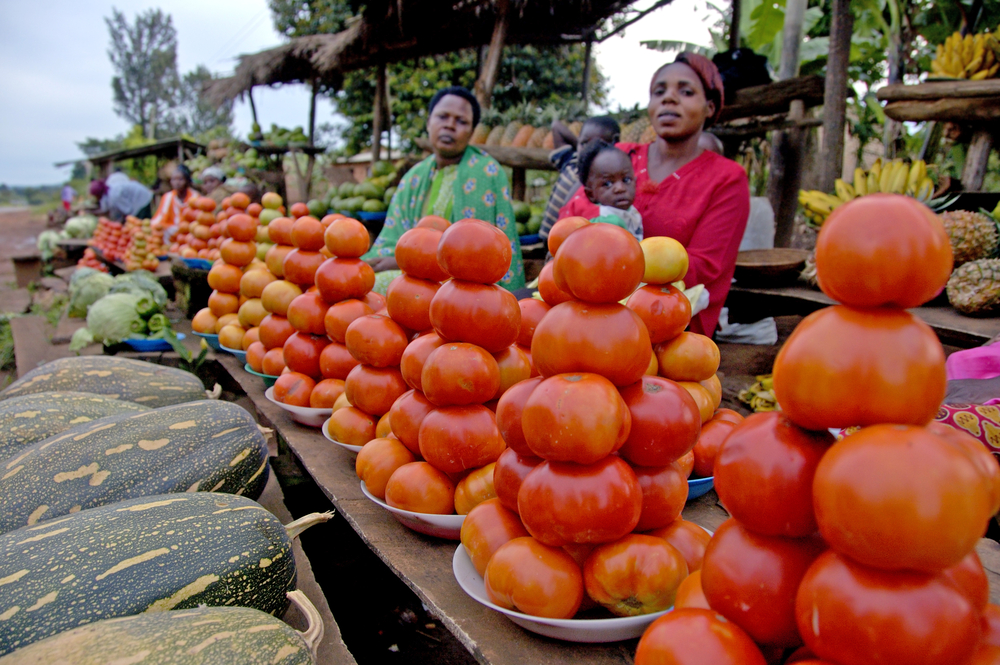Part of the Food Policy Snapshot Series
Policy name: Kampala City Urban Agriculture Ordinance, 2006
Overview: Prior to 2006, urban farming was illegal in Kampala, Uganda. The Urban Agriculture Ordinance set guidelines to legalize farming in urban and peri-urban areas.
Location: Kampala, Uganda
Population: 3.8 million
Food policy category: Sustainable agriculture, food security
Program goals: To make public land available for urban agriculture in order to allow residents to increase household food security.
How it works: The Urban Agriculture Ordinance requires any individual who practices farming within the city of Kampala to obtain a permit, and established farming businesses must be licensed.
Urban farmers who sell their produce must pay a small fee and put their name on the Kampala City Council (now the Kampala Capital City Authority)’s Urban Agriculture List in order to receive a permit and continue farming legally.
Established farming businesses are required to submit a formal application for licensure. Within 30 days of submitting the application, a production officer will inspect the farming location and, if it is in compliance with the Ordinance, an Urban Agriculture License will be provided. If the license is not granted, the applicant will receive advice on how to be in compliance.
The Ordinance does not permit farming in the following locations:
- Road reserves
- Wetlands
- Greenbelts
- Parks
- Places the Council deems to be dangerous because of poisonous chemicals
- Less than 10 feet away from an open drainage channel.
Pesticides must be used according to the manufacturer’s instructions so as not to pollute the environment or create a health hazard to others. Irrigation channels must not become breeding grounds for mosquitos or a source of waterborne diseases.
Repeated offenses will result in the loss of one’s permit or license.
Progress to date: A May 2023 article published in Nature reports that 95 percent of food consumed within Kampala is now produced within Uganda, and that urban agriculture generates double the amount of food, as measured by retail value, compared to external imports. As a result of urban sprawl and limited land space for farming, the Kampala Capital City Authority is now providing training centers to teach about vertical farming practices.
Why it is important: Kampala city residents rely heavily on urban agriculture for food access. Before it became legal, though, many urban farmers – particularly women – were subject to the enforcement of bylaws that could limit their ability to provide food for their families. The ordinance has made it easier for residents to access land for farming, and, as a result, it has also made it easier for residents to access local food. Local attitudes toward urban agriculture have shifted from concerns about health impacts from unregulated, unsanitary facilities, to more positive views regarding health benefits such as increased food access and a reduction in malnutrition.
Program/Policy initiated: The law was adopted in 2005 and went into effect in 2006.
Point of contact: N/A
Similar practices: The Urban Agriculture Ordinance was introduced simultaneously with four other Kampala ordinances regarding livestock and companion animals, fish, meat, and milk and milk products.
Evaluation: As noted above, the ordinance, whether directly or indirectly, has had many positive effects on agricultural practices and food access in Kampala, including more favorable attitudes toward urban agriculture on the part of the local government. However, many farmers are still unaware of the ordinances and, therefore, may be at risk for penalties.
Nature Journal’s study identifies a need for land tenure policies as well as urban and spatial planning on a national level to protect Kampala’s agricultural land in the midst of significant urban sprawl.
Learn more:
- Agricultural Sector (International Trade Administration)
- Building Urban Resilience: Assessing Urban and Peri-urban Agriculture in Kampala (UN Environment Programme)
- Resilient Governance Regimes That Support Urban Agriculture in Sub-Saharan Cities: Learning From Local Challenges (Frontiers in Sustainable Food Systems)
- Urban Agriculture Thriving in East Africa During COVID-19 (Alliance for Science)
References:
- The Kampala City Urban Agriculture Ordinance: A Guideline (KUFSALCC and Urban Harvest)
- The Local Governments (Kampala City Council) (Fish) Ordinance, 2006 (Kampala Capital City Authority)
- The Local Governments (Kampala City Council) (Livestock and Companion Animals) Ordinance, 2006 (Kampala Capital City Authority)
- The Local Governments (Kampala City Council) (Meat) Ordinance, 2006 (Kampala Capital City Authority)
- The Local Governments (Kampala City Council) (Milk and Milk Products) Ordinance, 2006 (Kampala Capital City Authority)
- The Local Governments (Kampala City Council) (Urban Agriculture) Ordinance, 2006 (Kampala Capital City Authority)
- Mapping the Consumer Foodshed of the Kampala City Region Shows the Importance of Urban Agriculture (Nature)
- Urban Agriculture Ordinances – Kampala, Uganda (Food Action Cities)
- Urban Farming in Kampala (BBC)


